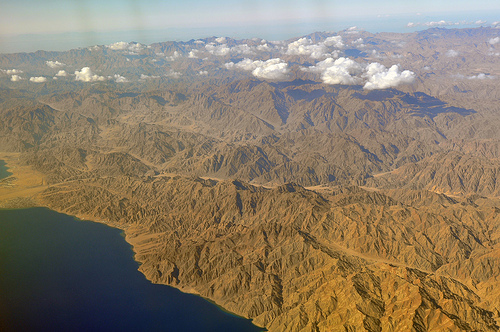Egyptian Army Returns To Sinai

The Egyptian army is set to enter Sinai for the first time since the signing of the 1979 Egypt-Israel Peace Treaty, which left the area demilitarized in exchange for Israel’s withdrawal.
Israeli officials approved the Egyptian request amid worries that Palestinian militants could exploit the current instability to smuggle arms. As the Associated Press reports:
“…Israeli officials have grown increasingly concerned about the stability of their southern neighbor. They are especially worried that Palestinian militants could take advantage of the unrest to smuggle weapons into the Gaza Strip through tunnels under the Egypt-Gaza border.”
According to the Dubai-based newspaper Gulf News, the recent protests have had the opposite effect on non-militant smuggling:
“Merchants and tunnellers said the pace of smuggling of fuel and other materials had dropped in recent days and reached its lowest level on Saturday as clashes between Egyptian residents of north Sinai and security forces intensified.”
Overall, the level of turmoil in Sinai has varied.
On one hand, attempts to quell protesters have resulted in deaths. In particular, an Egyptian man was shot and killed by police Friday during a peaceful protest outside the Sheikh Zweid Police station in Sinai.
Yet on the other hand, popular tourist cities like Sharm el-Sheikh remain relatively calm, apart from a access to the Internet. Pat Foote, a British tourist vacationing in the Sharm, told The Guardian:
"I heard that France has stopped all its citizens from travelling here. And I worried about us going. It's been all over the news at home and my family was saying, 'Are you sure you should be going there?' But now we're here, it seems pretty relaxed."
Compare “relaxed” Sinai to Cairo’s Tahrir Square, where approximately 250,000 protestors are calling for the resignation of Egyptian President Hosni Mubarak. Or Cairo at large, where looters have driven some residents to arm themselves with “guns, clubs and knives.”
Still, foreign governments are urging their citizens to avoid all parts of Egypt. In particular, the United States plans to evacuate its citizens from the country as the State Department issued a travel warning Sunday recommending “that U.S. citizens avoid travel to Egypt due to ongoing political and social unrest.”
Despite the rising tensions in Egypt, Sinai has seen worse. In July 2005, overnight blasts killed 88 people in Sharm el-Sheikh, less than a year after attacks killed 34 people further north in Sinai. In April 2006, three blasts rocked the city of Dahab, killing 23 people and drawing widespread condemnation from an array of figures including Mubarak, the Hamas-led Palestinian government and then-US President George W. Bush.
Yet historically, tourism in Egypt - which accounts for around 11 percent of the country’s GDP - slumps only temporarily after periods of unrest. As noted by Reuters:
“When gunmen killed 58 tourists and four Egyptians at an ancient temple in Luxor in 1997, tourism slumped but picked up fairly quickly and since then has weathered disruptions relatively well. The September 11, 2001 attacks, the second Palestinian Intifada, and a series of bomb attacks on tourist resorts in Sinai from 2004 to 2006 all led to temporary decreases in tourist arrivals, but the trend over the last decade has been broadly upward.”
Sinai has been under Egyptian control since 1982, when Israel left the region entirely under the provisions of 1979 Egypt-Israel Peace Treaty. Then Israeli Prime Minister Menechem Begin and Mubarak’s predecessor Anwar el-Sadat signed the treaty.
Reach reporter Aaron Liu here.



